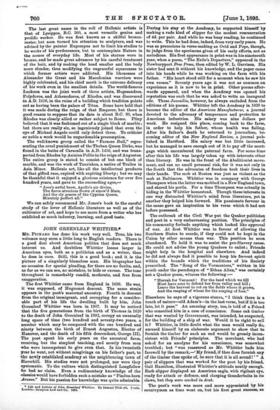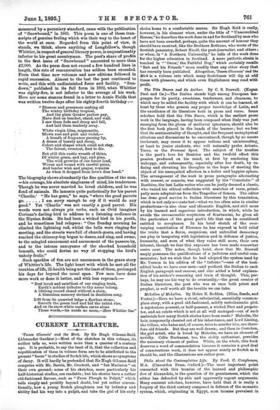JOHN GREENLEAF WHITTIER.*
Ma.. PICKARD has done his work very well. True, his two volumes may seem a little long to English readers. There is a good deal about American politics that does not much interest us. And doubtless Whittier looms larger in American eyes, both as a politician and as a writer, than he does in ours. Still, this is a good book ; and it is the picture of a singularly blameless man. His biographer has no occasion for special pleading, for there are no faults, and, as far as we can see, no mistakes, to hide or excuse. The tone throughout is remarkably candid, moderate, and free from exaggeration.
The first Whittier came from England in 1638. He was, it was supposed, of Huguenot descent. The same strain appears in the poet's maternal ancestry. Fourth in descent from the original immigrant, and occupying for a consider- able part of his life the dwelling built by him, John Greenleaf Whittier was born in 1807. It may be noticed that the five generations from the birth of Thomas in 1620 to the death of John Greenleaf in 1892, occupy an unusually long space of time (two hundred and seventy-two years, a number which may be compared with the one hundred and ninety between the birth of Ernest Augustus, Elector of Hanover, and the death of his fifth descendant, George III). The poet spent his early years on the ancestral farm, receiving but the simplest teaching, and mostly from men who were incompetent to give even that. In his twentieth year he went, not without misgivings on his father's part, to the newly established academy at the neighbouring town of Haverhill. His studies were not prolonged, nor were they systematic. To the culture which distinguished Longfellow 'he had no claim. Even a rudimentary knowledge of the -classics would have forbidden such a mistake as " Pindns-born dirazee." But his passion for knowledge was quite admirable.
• Life and Letters of John Greenleaf Whittier. By 2amnel Pickard. 2 rola. London t Sampson Low and Co. 1895.
During his stay at the Academy, he supported himself by making a rude kind of slipper for the modest remuneration of 4d. per pair. And while he was busy reading, he continued to write. This he had done, indeed, from very early years. He was as precocious in verse-making as Ovid and Pope, though, to judge from the specimens given of his early efforts, not as melodious. His first appearance in print was in his nineteenth year, when a poem, "The Exile's Departure," appeared in the Newburyport Free Press, then edited by W. L. Garrison. His sister had sent it without his knowledge, and the paper came into his hands while he was working on the farm with his father. "His heart stood still for a moment when he saw his own verses." Seventy years ago it was not as common an experience as it is now to be in print. Other poems after- wards appeared, and when the Academy was opened his reputation was such that he was asked to write an inaugural ode. These Juvenilia, however, he always excluded from the editions of his poems. Whittier left the Academy in 1828 to become the editor of the American Manufacturer, a journal devoted to the advocacy of temperance and protection to American industries. His salary was nine dollars per week. He resigned this place, coming back to the farm, in order to help his father, whose health was failing.
After his father's death he returned to journalism, be- coming editor of the New England Review, a journal pub- lished in Hartford. His salary was but little increased, but he managed to save enough out of it to pay off the mort- gage which encumbered the paternal farm. For some time after this his life was largely taken up with interests other than literary. He was in the front of the Abolitionist move- ment, and ran no small personal risk, for it was not only in the South that the advocates of freedom took their lives in their hands. The mob at Boston was just as violent as the mob at Baltimore. Whittier was in company with George Thompson when the latter was mobbed in a New England town, and shared his perils. For a time Thompson was actually in hiding in the Whittier homestead. Though these interests in one way distracted Whittier's mind from literature, yet in another they helped him forward. His passionate fervour in the cause gave an inspiration to his verse which it had not before possessed.
The outbreak of the Civil War put the Quaker politician and poet in a very embarrassing position. The principles of his community forbade anything which looked like approval of war. At first Whittier was in favour of allowing the Southern States to secede, if they could not be kept in the Union by other means than war. This position he soon abandoned. To hold it was to assist the pro•Slavery cause. He could not advise the young Quakers to enlist ; Friends might help in the hospital and elsewhere. And indeed he did not always find it possible to keep his fervent spirit within the bounds which the traditions of his Society prescribed. The " Song of the Vermonters," written in his youth under the pseudonym of "Ethan Allen," was certainly not a Quaker poem, witness the following :—
" Hurrah for Vermont ! For the land which we till Must have sons to defend her from valley and hill; Leave the harvest to rot on the fields where it grows, And the reaping of wheat for the reaping of foes."
Elsewhere he says of a vigorous stanza, "I think there is a touch of nature—old Adam's—in the last verse, but if it is too late, let it pass." An amusing story, too, is told of a Friend who consulted him in a case of conscience. Some oak timber
that was wanted by Government, was intended, he suspected, for the building of a ship of war. Would it be right to sell
it ? Whittier, in little doubt what the man would really do, amused himself by an elaborate argument to show that to furnish the timber for such an end would be grossly incon- sistent with Friends' principles. The merchant, who had asked for an anodyne for his conscience, was somewhat troubled ; but "was reassured as Mr. Whittier bade him farewell by the remark,—` My friend, if thee does furnish any of the timber thee spoke of, be sure that it is all sound! ' " A
pair of slippers that was worked for the poet by his friend, Gail Hamilton, illustrated Whittier's attitude neatly enough.
Each slipper displayed an American eagle, with vigilant eye, ready for attack or defence, and clasping thunderbolts in its claws, but they were worked in drab.
The poet's work was more and more appreciated by his countrymen as time went on, but his first great success, as measured by a pecuniary standard, came with the publication of "Snowbound," in 1865. This poem is one of those tran- scripts of genuine feeling which win their way to the heart of the world at once. Regarded from this point of view, it stands, we think, above anything of Longfellow's, though Whittier, in respect of general literary power, is unquestionably inferior to his great countryman. The poet's share of profits in the first issue of " Snowbound " amounted to more than 22,000. As the poem does not exceed a few hundred lines in length, this rate of remuneration has seldom been exceeded. Froin that time new volumes and new editions followed in rapid succession. Almost to the last the poet continued to write, and this with undiminished force and facility. " Sun- down," published in its full form in 1892, when Whittier was eighty-five, is not inferior to the average of his work. Here are some stanzas found in a letter to Annie Fields that was written twelve days after his eighty-fourth birthday Blossom and greenness making all The wintry birthday tropical, And the plain Quaker parlors gay, Have died on bracket, stand, and wall. I saw them fade and droop and fall, And laid them tenderly away.
White virgin lilies, mignonette, Blown rose and pink and violet,— A breath of fragrance passing by,
A dream of beauty and decay,
Colors and shapes which could not stay, The fairest, sweetest, first to die.
But still this rustic wreath of thine, Of winter green, and bay, and pine, The wild growths of our forest land, Woven and wound with careful pains, And tender wish and prayer, remains As when it dropped from love's dear hand."
The biography shows abundantly the fine qualities of the man, —his courage, his absolute singleness of mind, his tenderness.
Though he was never married he loved children, and he was fond of animals. He laments quite pathetically for his parrot 'Charlie.' " He has gone," he says, " where the good parrots go I am sorry enough to cry if it would do any
good." Yet Charlie' was not exactly a good parrot. His words were not always pia verba, such as Ovid imagines Corinna's darling bird to address to a listening audience in the Elysian fields. He had been a wicked bird in his youth, and he sometimes had relapses : " One Sunday morning he climbed the lightning rod, whilst the bells were ringing for
meeting, and the streets were full of church-goers, and having reached the chimney-top began to dance, and sing, and swear, to the mingled amazement and amusement of the passers-by, and to the intense annoyance of the shocked household beneath, who could devise no way of stopping the bird's unholy frolic."
Such sparkles of fun are not uncommon in the grave story of Whittier's life. The light heart with which he met all the troubles of life, ill-health being not the least of them, prolonged his days far beyond the usual span. Few men have done more work or done it better, and with less reproach :—
" Best loved and saintliest of our singing train,
Earth's noblest tributes to thy name belong. A lifelong record closed without a stain, A blameless memory shrined in deathless song.
Lift from its quarried ledge a flawless stone ; Smooth the green turf and bid the tablet rise, And on its snow-white surface carve alone
These words,—he needs no more,—Here Whittier lies."







































 Previous page
Previous page